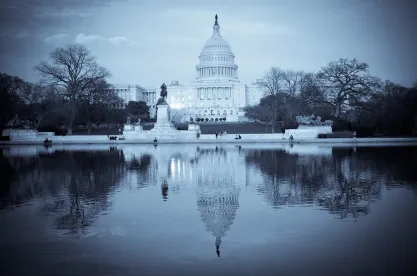Coronavirus cases in the US are surging. States are closing bars and restaurants. States, local governments, schools and private enterprises are calling upon the federal government for aid, and the US Congress is preparing to craft bipartisan emergency legislation of US$1 trillion or more. It’s March 2020 all over again – only this time, legislators face a series of looming deadlines, and a presidential election four months away.
Long-anticipated bipartisan negotiations to determine the size, scope and specifics of the next federal COVID-19 response legislation are set to formally commence next week when members of the House of Representatives and Senate return to Washington for a two-to-three week stretch. The Republican majority in the Senate is expected to put forth a proposal, currently being drafted in the office of Majority Leader Mitch McConnell (R-KY), in the coming days that will serve as Republicans’ opening bid in the talks and the party’s initial counteroffer to the US$3.5 trillion pandemic relief measure (the HEROES Act) passed in May by House Democrats. Multiple Senate GOP committee staffers report they have been busy in recent days preparing for the introduction of a Senate bill led by McConnell that includes some provisions already effectively negotiated between Republican and Democratic members of the chamber. Unknown, and largely unknowable at this point, is how the Pelosi-led House will respond.
House Speaker Nancy Pelosi (D-CA) is framing McConnell’s preparatory actions as a victory for Democrats, suggesting that the previous Republican position had been that “zero” new coronavirus aid by the federal government was required, and that Democrats have forced the GOP into negotiations on a new round of relief (see coverage here). The reality is that the upcoming talks have been planned by both parties for months, and are unfolding largely along the timetable set back in May by the GOP. The Speaker’s messaging is notable, however, in that it is likely the beginning of an effort by Pelosi to prepare her Democratic colleagues to view anything that is eventually produced by the bipartisan negotiations as a “win” for her party, with the realization that the eventual bipartisan agreement will inevitably be more limited than HEROES.
The task ahead for McConnell, Pelosi and the other principal negotiators – Senate Minority Leader Chuck Schumer (D-NY), House Minority Leader Kevin McCarthy (R-CA) and Treasury Secretary Steven Mnuchin – is by no means a simple one. [“They’ve got a long way to go, and a short time to get there,” quipped former House Speaker John Boehner (R-OH) in remarks to Squire Patton Boggs colleagues on Tuesday, paraphrasing the late Jerry Reed’s lyrics from the classic 1977 movie Smokey and the Bandit.]
Via POLITICO:
If you’re tracking the Covid relief bill, expect a lot of turbulence in the coming weeks. Right now, the two sides are in totally different places. The GOP wants to condition money to schools reopening, Dems say no way. Republicans want to cut away at enhanced unemployment, Dems want to extend it. Democrats want a healthy state and local funding program, Republicans are skeptical. Republicans and Democrats disagree on liability overhaul. So, in short, everything is up in the air.”
House Majority Leader Steny Hoyer (D-MD) has told members of the House Democratic Caucus to prepare for the House to remain in session past its scheduled July 31 departure date to ensure that the next COVID-19 relief measure can be completed. The Senate is scheduled to be in session during the first week of August, making it likely that the package will be finalized and sent to President Donald Trump during that stretch.
The drive to enact the next coronavirus bill will play out against the backdrop of the looming presidential election. Presumptive Democratic presidential nominee Joe Biden, the former vice president, is rising in national poll matchups against Trump, who on Wednesday replaced his campaign manager. Biden is slated to announce his choice for running mate in early August, and the two parties will hold their presidential nominating conventions next month.
Topics covered in this issue include: US federal budget and appropriations, tax and economic development, health, international trade, European policy, US government oversight and investigations, US states developments.
Publication Note: To focus our coverage and to provide a more regular cadence, the publication schedule of the Policy Report will shift to Tuesdays and Thursdays ahead of the US Congress August district work period.
Appropriations Updates
Following a two-week recess, the House and Senate return to Washington on July 20 with a robust legislative agenda that includes must-pass spending bills, consideration of the National Defense Authorization Act, and the resumption of work on the next phase of economic stimulus and COVID-19 legislation.
Taking advantage of the temporary lull in congressional deliberations during the first two weeks of July, the House Appropriations Committee has pursued an aggressive timeline to advance each of the 12 annual spending bills, which fund the entire US government and shape public policy for the upcoming fiscal year. After reporting each of the measures to the full committee over a three-day period last week, the spending panel has now reached the half-way mark in its month-long legislative marathon, moving swiftly to report all of the funding measures out of committee and prepare them for consideration by the full House in the coming weeks.
Committee Republicans have been largely sidelined in the process of drafting spending bills, a reflection of their limited role as the minority party in the House. Throughout two weeks of committee markups, they have raised numerous objections to the Democratic majority’s inclusion in spending bills of emergency spending outside of statutory budget caps. The Transportation, Housing and Urban Development spending bill, which includes US$75 billion in emergency funding, is illustrative of how committee Democrats have bypassed statutory spending caps established by the Bipartisan Budget Act of 2019 (Public Law 116-37). In this measure, the emergency funding provided doubles the size of the overall bill and allocates extra resources to transportation and housing infrastructure to assist in the economy’s recovery from the pandemic.
Policy provisions, too, have divided the parties during committee consideration of fiscal year 2021 bills. Over the objection of Republicans, the committee approved language in the Defense spending bill to prohibit the U.S. military use of force against Iran without explicit congressional authorization. The committee also approved an amendment to repeal the 2001 authorization (PL 104-40) for the use of military force against those responsible for the September 11 terrorist attacks in the US. This statutory language remains in use today to authorize US efforts to combat global terrorism. These provisions, as well as numerous other policy riders included across other bills, will face strong opposition by the GOP-controlled Senate and the Trump White House. GOP-sponsored amendments offered during full committee deliberations to strip numerous bills of offending provisions failed on straight party-line votes.
I am disappointed that we were unable to get changes made during committee markups to ensure that these important bills could be supported by Members of both parties,” said the committee’s lead Republican, Representative Kay Granger (R-TX). “I hope we can work together to resolve our differences and fulfill the bipartisan, bicameral budget agreement we made less than a year ago.”
The full committee process – noteworthy for its vigorous debate over funding and policy – has been tempered this year by COVID-19. The pandemic’s impact has been clearly evident, as members in both parties offered fewer amendments than is customary at this stage, seemingly intent to promptly advance the committee’s work. Additionally, for the first time in memory, the committee process has been closed to most Capitol Hill staff and is accessible to the public only by livestream webcast. The bills emerging this week from committee, and soon to emerge from the full House, will serve as the House marker for negotiations on final spending bills likely to occur later this year.
The appropriations process will move to the full House next week. As outlined in a recent Dear Colleague letter by Majority Leader Hoyer, the Committee will combine four individual spending measures – Agriculture, Interior & Environment, Military Construction/Veterans Affairs, and State & Foreign Operations – into an appropriations minibus the House will debate, amend, and consider on July 23-24. The House will vote on a second spending package during the last week of July, attempting to complete its appropriations work prior to the traditional August congressional recess.
To date, the Senate appropriations process remains sidelined by partisan disputes over additional funding for COVID-19 priorities, social justice funding, and other policy provisions. The Senate’s lack of progress in advancing spending bills has heightened concerns that Congress will fall short in negotiating a government-wide, final funding agreement prior to the end of the fiscal year on September 30.
With a dwindling number of legislative days prior to the November 3 elections, it remains likely that a Continuing Resolution, or CR, will be necessary to maintain continuity of government funding for the new fiscal year that begins on October 1. Final funding decisions are likely to be pushed until December, or depending upon the outcome of US national elections, potentially into the early months of 2021.
Tax and Economic Development Updates
Yesterday, the Federal Reserve Board announced that it plans to immediately extend “a rule change to bolster the effectiveness of the Small Business Administration’s (SBA) Paycheck Protection Program (PPP)…[that] will temporarily modify the Board’s rules so that certain bank directors and shareholders can apply to their banks for PPP loans for their small businesses.” According to the Federal Reserve, it is “providing the temporary change to allow banks to continue to make PPP loans to a broad range of small businesses within their communities.” The Federal Reserve will accept comments on the rule change for 45 days following its publication in the Federal Register; however, the rule change is effective immediately and for the duration of the PPP. As for other federal financial assistance programs, Patrick Harker – President of the Federal Reserve Bank of Philadelphia – acknowledged that there has thus far been limited interest (approximately 400 banks have registered to participate) in the Main Street Lending Program, but suggested that may be “actually a good sign for the economy because it means that firms have access to capital without having to use the Fed.”
Looking ahead at the next round of COVID-19 relief, negotiations remain ongoing. Chief among the issues to be resolved: how to address the US$600 per week expanded unemployment benefits, which are set to expire at the end of July. While House Democrats’ HEROES Act would extend the benefits through the end of the year, that remains a “red line” for Senate Republicans, who instead appear to be coalescing around Senator Rob Portman’s (R-OH) US$450 per week “return to work” bonus proposal. To that end, Secretary Mnuchin has indicated that, if the expanded unemployment benefits are ultimately extended, the Treasury Department is working on a “technical fix” to prevent workers from earning more from unemployment benefits than they would earn on the job.
Additionally, Secretary Mnuchin last week expressed support for federal aid for a number of industries, including restaurants, hotels, and airlines. To that end, the National Restaurant Association is proposing that Congress provide support for the restaurant industry, including a US$120 billion relief fund, additional PPP loans and a change to allow businesses to deduct expenses paid for with PPP loans. Beyond these key industries receiving attention from the White House, there are a myriad of other industries that lawmakers may target for assistance as part of the next COVID-19 relief package. For example, last week, House Transportation and Infrastructure Committee Chairman Peter DeFazio (D-OR) introduced legislation that would “give the maritime sector the same protections and relief given to other industries during COVID-19,” and “close a huge gap in current federal emergency assistance that has left links in the maritime supply chain isolated and unable to access other assistance programs available to other industries.”
Last month, the Office of the Comptroller of the Currency issued a bulletin providing that “federal law preempts state and local laws that impermissibly conflict with banks’ exercise of federally authorized powers,” including those that “address foreclosure and repossession moratoriums, loan forbearance, and limitations on the interest and fees banks may charge.” In response, Senator Amy Klobuchar (D-MN), along with a number of other Senate Democrats, sent a letter to Acting Comptroller of the Currency Brian Brooks expressing concern over the bulletin, noting that federal preemption must be determined on a case-by-case basis, not en masse. The letter also notes that “[s]tate and local officials across the nation have worked with local banks and financial institutions to ensure that families have confidence that pandemic-related unemployment or loss of income will not also cause them to lose their home through foreclosure.”
Other developments of note since last week’s report include:
-
The Treasury Department and the Internal Revenue Service have issued Notice 2020-54, which requires employers to report the amount of qualified sick and family leave wages paid to employees under the Families First Coronavirus Response Act on Form W-2.
-
In its June 2020 Monthly Treasury Statement, the Treasury Department indicated that Highway Trust Fund receipts for June are down 41% compared to June 2019. Notably, while the Highway Trust Fund is not expected to run out of funding before the end of the current fiscal year – despite the decrease in receipts – this may pose yet another roadblock as lawmakers look to reauthorize the program.
Health Updates
On Friday, the Department of Health and Human Services (HHS) announced the distribution of US$4 billion to hospital providers under the Provider Relief Fund (PRF). US$3 billion will be distributed to another group of “safety-net” hospitals who did not qualify under previous methodology. The new payments will be issued to hospitals with a profitability threshold of 3%, averaged consecutively over two or more of the last five cost reporting periods. After this issuance, total payments for safety net hospitals from the PRF amount to US$12.8 billion across 959 facilities. The other US$1 billion will utilize an existing payment formula to include certain special rural Medicare designation hospitals in urban areas, as well as others who provide care in smaller non-rural communities. HHS also announced changes to the Enhanced Provider Relief Fund Payment Portal which will allow dentists to apply and be reimbursed up to 2% of their annual reported patient revenue. Dentists will have until July 24 to request funding.
As nursing homes across the country continue to face challenges in the face of the pandemic, the Centers for Medicare and Medicaid Services will be deploying Quality Improvement Organizations (QIOs) to provide immediate assistance to nursing homes in the hotspot areas as identified by the White House Coronavirus Task Force. These QIOs will work with providers to assist them with issues like infection control, practices to limit potential transmission, and prevent widespread outbreaks within these facilities. Additionally, Vice President Mike Pence announced that HHS will supply 2,000 nursing homes with COVID-19 point-of-care tests in regions most at risk. HHS Assistant Secretary for Health Brett Giroir said the department would send those 20 test-per-hour machines next week.
Giroir, also known as President Trump’s “testing czar,” has been speaking to numerous news outlets about the status and future of diagnostic testing. Giroir told National Public Radio in an interview that “unprecedented demand” is leading to the delay of COVID-19 diagnostic testing results, but that the US is in “an incredibly much better place” than in the beginning stages of the pandemic. He noted that the US is “well on track” to perform 100 million tests per month by September. This will be in part fueled by “pooling techniques,” in which samples from multiple people would be combined and tested together. He also defended the White House’s Coronavirus Task Force by telling NBC’s the Today Show, “we may make mistakes occasionally, but none of us lie.”
Meanwhile, Democratic members of the Senate Committee on Health, Education, Labor and Pensions issued a scathing report on the Trump Administration’s testing efforts to date. The report stated that, “the US is still far from where experts say the nation should be to effectively track and contain the disease and to get the nation back to work and school safely.” The report also included recommendations on how to improve testing capacity, apply lessons learned to vaccine development and delivery, and ensure a stronger response to future infectious disease outbreaks, such as guaranteeing long-term investments in public health infrastructure and rebuilding the national stockpile.
Trade Updates
At a briefing on Tuesday, President Trump said that he would soon sign a measure on merit-based immigration, suggesting the action would also address beneficiaries of the Deferred Action for Childhood Arrivals, or DACA, program. DACA provides discretionary relief from removal and work authorization for certain undocumented immigrants brought to the United States prior to their 16th birthday. The Supreme Court recently ruled that the administration could not immediately end the DACA program, but the opinion was based on procedural grounds, leaving the door open for the administration to act again to terminate it. During the press conference, President Trump said that the administration would “be taking care of people from DACA in a very Republican way.”
On July 10, the Office of the US Trade Representative (USTR) announced that it would impose retaliatory tariffs on certain French goods in response to the country’s digital services tax (DST). The decision comes following a Section 301 investigation initiated in December 2019 into whether France’s DST is unreasonable or discriminatory and burdens or restricts US commerce. After finding grounds to take action, USTR announced the list of goods that could be subject to tariffs, but put the action on hold as French officials agreed to delay the tax as multilateral negotiations for a global agreement on DSTs continued. As world leaders face increasing budget pressures in light of the COVID-19 pandemic, France announced earlier this summer that it would proceed with the tax. The tariff action – which targets so-called “luxury goods” like handbags, soaps and cosmetics, but does not impact wines or cheeses – comes as USTR is considering whether to take similar actions against DSTs adopted or under consideration by a number of other trading partners, including the European Union, India and the United Kingdom. Affirmative findings in those investigations could lead to a flurry of new retaliatory tariffs yet this year.
US, Mexican and Canadian officials are reportedly planning to extend restrictions on nonessential travel across their borders another 30 days. Those restrictions – originally set in March and renewed monthly since – are currently scheduled to expire on July 21. The limits apply only to personal travel, and do not apply to crossborder trade.
European Policy Updates
While the COVID-19 infection rates in European countries were stable for the last month, a resurgence of cases or large localized outbreaks have been increasing in some European regions the last two weeks. Experts fear that this could initiate the second wave of COVID-19 infections in some European countries or regions, which could potentially spread throughout the continent, as internal borders have slowly reopened. Some European countries impose specific restrictions (for example obtaining a PCR test 72 hours before travelling) and others ease the restrictions based on epidemiological statistics. The United Kingdom (UK), for example, decided to lift its 14-day quarantine requirement for citizens travelling to and from most EU countries in early July.
Meanwhile, an external ‘safe travel list,’ which recommends lifting restrictions on travel to and from the EU to third countries, became effective on July 1. The third country travel list adopted by the Council of the EU is voluntary – thus, the decision to allow travel is up to each Member State. The US is notably absent from the list, as the spread of the virus in the US remains prominent. China, on the other hand, is on the list subject to confirmation of reciprocity. The travel list will continue to be reviewed every two weeks, depending on how the epidemiological situation evolves. EU27 Ambassadors decided on July 14 as the date to remove Serbia and Montenegro from the safe travel list, as the situation is deteriorating in those countries.
On July 15, the European Commission published guidelines for the short-term preparedness measures aiming to strengthen EU health preparedness for existing and future outbreaks. This includes a number of recommendations, namely increased testing coverage, contact tracing and surveillance by public health bodies, ensuring a smooth supply of personal protective equipment (PPE), medicines, and medical devices, and maintaining rapid access to public health surge capacities, among others.
As European businesses and market participants respond to the impact of the coronavirus pandemic, a set of Best Practices to provide relief for consumers and businesses was agreed to by the financial sector, consumer and business organizations on July 14. The document covers a number of issues, such as ways to enable safer cashless payments and ways to process and pay out legitimate insurance claims. It also includes best practices for bank and non-bank lending to consumers and business, as well as best practices for insurers. The European Commission coordinated the stakeholder dialogue to create the best practices, in a broader effort to increase lending to the real economy.
The European Commission and the Global Citizen held on June 29 another global pledging summit, ‘Global Goal: Unite for our Future’, which mobilized EUR€6.15 billion (US$7.03 billion) that will further fund efforts to develop and ensure equitable access to coronavirus vaccines, tests and treatments. The amount included a EUR€4.9 billion (US$5.6 billion) from the European Investment Bank and EUR€485 million (US$554 billion) committed by Member States. This brings the total pledges under the European Commission’s initiative, the Coronavirus Global Response, to EUR€15.9 billion (US$18.17 billion).
Throughout the COVID-19 Pandemic, the European Commission has provided a lot of flexibility in relation to the state aid rules through a Temporary Framework. To support the micro, small and start-up companies and incentivize private investments, the Commission decided on June 29 to amend for the third time the State aid Temporary Framework. This amendment will help companies under existing state aid rules, such as the Rescue and Restructuring Guidelines, to develop sound restructuring plans (based on a set of criteria) that will allow them to achieve a long-term viability. The amendment also introduces adapted recapitalization conditions, so that private investors can contribute to the capital increase of companies together with the state.
Throughout the ongoing crisis, governments across Europe and the Middle East have sought to support businesses in three principal ways – giving them money, lending them money and relieving them of their bills and financial commitments. This updated guide, now with additional content for a number of key Middle East countries, summarizes government financial support, loan scheme and financing facilities, employee support, insurance and tax, and assistance available for the self-employed. The guide outlines the types and levels of funding available, eligibility, how to apply and how to access the support.
Public procurement in the UK is governed by statutory rules, including the Public Contracts Regulations 2015, with which contracting authorities and their suppliers must comply if the contract value hits the necessary thresholds. However, the ongoing COVID-19 crisis means that contracting authorities and suppliers have to adapt with extreme urgency in relation to the procurement of goods and services, whether it is the urgent need for certain goods or services (such as PPE or IT support) or a sudden requirement for delay or redeployment of others (such as school transport services). Three fact sheets from Squire Patton Boggs (see here, here and here) summarize the new specific guidance from the UK government and the European Commission on using the public procurement framework during COVID-19.
Oversight Updates
Chairman James Clyburn and all Democratic Members of the House Committee on Oversight and Reform’s Select Subcommittee on the Coronavirus Crisis have launched an investigation into contracts entered into by the Trump Administration to procure PPE, testing supplies and other medical equipment. The subcommittee is also looking into the steps the administration is taking to address ongoing supply shortages during the pandemic. The subcommittee sent document requests to HHS Secretary Alex Azar, Defense Secretary Mark Esper, Homeland Security Acting Secretary Chad Wolf, and Veterans Affairs Secretary Robert Wilkie. Letters have also gone out to seven companies whose contracts the Subcommittee is questioning. Those companies are Zach Fuentes, LLC; AvMEDICAL, LLC; Phlow Corporation; AirBoss / Immediate Response Technologies, LLC; Fillakit, LLC; Federal Government Experts, LLC; and Panthera Worldwide, LLC.
On Monday, Chairman Clyburn sent a letter to Vice President Pence and Secretary Azar, requesting that the administration reconsider its refusal to make Dr. Anthony Fauci, Secretary Azar, and Dr. Deborah Birx available to testify before the Select Subcommittee, and calling for the production of documents, due some time ago, on the administration’s plans to contain the coronavirus. With regard to Dr. Fauci, Chairman Clyburn pointed out that, while the administration maintained that he was unavailable to testify because he “is dedicated to the mission at hand,” press reports indicate that the White House has been limiting his role in the administration’s response efforts.
In response to questions from Senator Elizabeth Warren (D-MA) in May about risks from changes to Department of Defense pricing and contracting policy amid the COVID-19 pandemic, Under Secretary of Defense for Acquisition and Sustainment Ellen Lord indicated that large defense contractors cannot divert the increased progress payments towards share buybacks, dividends, or executive salaries. The revised defense contracting policy increased the rate of progress payments from 80% to 90% for large businesses and from 90% to 95% for small businesses.
Retired General Joseph Dunford has removed himself from consideration to lead the five-member Congressional Oversight Commission established under the CARES Act. While the Commission has four members, it has been without a chair since its creation almost four months ago. Majority Leader McConnell and Speaker Pelosi are to appoint the chair jointly but have not been able to reach an agreement. The Washington Post reports that the reasons for General Dunford’s withdrawal are unclear, although the fact that the coronavirus response has become increasingly politicized may have something to do with it.
More people have been charged with fraud related to the PPP. The owner of a Massachusetts information technology services company was indicted on four counts of wire fraud and one count of making a false statement to a financial institution in relation to a US$13 million PPP loan application. Also, a Texas man was arrested on charges of making false statements to a financial institution, wire fraud, bank fraud and engaging in unlawful monetary transactions in relation to a US$1.1 million PPP loan, part of which he used to invest in a cryptocurrency account. Further, the owner of a residential construction contracting firm based in Washington, D.C. was charged with allegedly submitting fraudulent documents to a bank in connection with applications seeking more than US$400,000 in PPP loans.
Last week:
-
The Pandemic Response Accountability Committee, the new council of 21 existing Inspectors General (IGs) created under the CARES Act, released a video highlighting its accomplishments in the first 90 days of its existence. They include: launching pandemic.oversight.gov with the Contract Spending for Pandemic Relief dataset and map, issuing a report highlighting the Top Challenges Facing Federal Agencies, releasing 21 public oversight reports by its member IGs, conducting investigations which have resulted in 36 arrests or indictments and 4 fraud civil actions; and initiating 74 ongoing oversight projects.
-
The Select Subcommittee on the Coronavirus Crisis also released a video featuring Chairman Clyburn, in which he encouraged Americans to report misuse of federal relief funds to the Select Subcommittee. “With trillions of taxpayer dollars and the health and wellbeing of millions of Americans at stake, robust oversight is essential,” Clyburn said.
-
Senator Elizabeth Warren sent a letter to American Correctional Association (ACA) Director James Gondles Jr. regarding the ACA’s procedures for inspecting and accrediting correctional facilities during the COVID-19 pandemic. The letter is part of Senator Warren’s ongoing investigation into the ACA and its accreditation process for correctional facilities, following reports of mismanagement and poor conditions in such facilities nationwide.
US States Updates
Mandating mask wearing has been a polarizing political issue and the call of governors across the country. But the tides seem to be turning lately, with more reinforcements from across the country as the number of positive COVID-19 cases continues to climb.
National chains Walmart, Kroger and Kohl’s announced they will begin requiring customers to wear masks in their stores. Most major retailers and grocers initially hesitated to implement their own mask mandates, partly for fear of antagonizing shoppers who refuse to wear them and struggling to enforce mask requirements, which has initiated confrontations between customers and employees. Retailers have also been reluctant to put their employees in the position of policing their customers. But as the coronavirus pandemic worsens, retailers are feeling more compelled to put mask mandates into place. Starbucks and Best Buy also announced they are requiring masks to be worn in their stores.
After many months of not wearing a mask publicly, President Trump donned one for the first time during a recent visit to Walter Reed National Military Medical Center. He said, “I’ve never been against masks, but I do believe they have a time and a place.”
While there currently is no federal mandate to wear masks, the Centers for Disease Control and Prevention confirmed in an editorial published in the Journal of the American Medical Association that cloth face coverings are a critical tool in the fight against COVID-19 and could reduce the spread of the disease, especially when universally used within communities. “There is increasing evidence also that cloth face coverings help prevent people who have COVID-19 from spreading the virus to others.”
Research also shows that a mask mandate is not only valuable from a public health perspective but an economic one as well. A recent reportconducted by Goldman Sachs said wearing a mask serves “as a substitute for renewed lockdowns that would otherwise subtract nearly 5% from GDP.”
Still there are governors who remain steadfast about not mandating mask wearing yet in their states. Yesterday, Oklahoma Governor Kevin Stitt (R) became the first governor in the US to test positive for COVID-19, and even with the state having record-breaking days of positive cases this week, he said he has not changed his mind on issuing a statewide mandate for wearing masks. “We respect people’s rights … to not wear a mask,” Governor Stitt said during his Wednesday news conference, which was held virtually. “You just open up a big can of worms.”
Brandon Roman, Mara Sheldon, Christina Economides, Meg Gilley and Genevieve Bresnahan contributed to this article.








 />i
/>i
